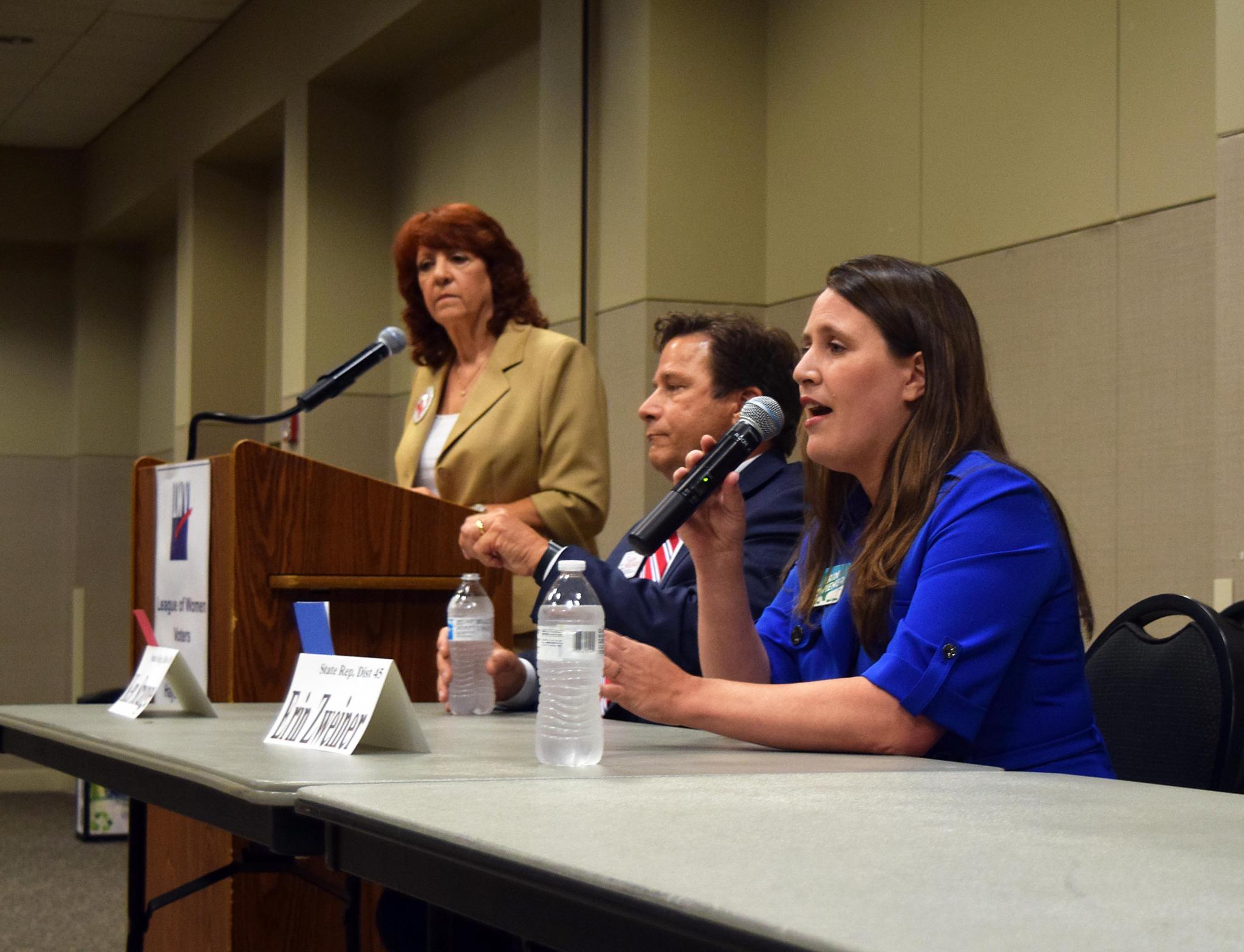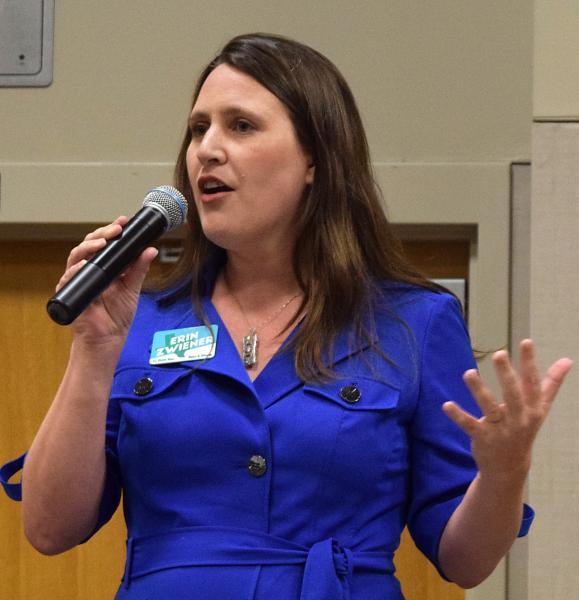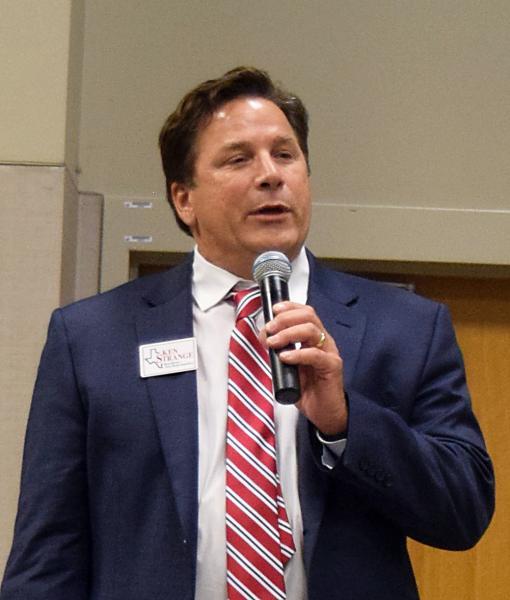
Moderator Kaylene Ray with State Rep. 45 candidates Ken Strange and Erin Zwiener. Daily Record photo by Rachel Willis
Strange, Zwiener discuss the issues for Dist. 45 voters
The League of Women Voters (LWV) of Hays County, a nonpartisan political organization that encourages active voter participation, held a debate for county and state candidates last Thursday. State District 45 candidates Erin Zwiener and Ken Strange took the stage to make their case to voters.
Strange highlighted in his opening remarks that education and water conservation were his two main concerns in District 45.
“I decided to run for this position because I love this area, I love the people of this area and I think that things could be done better,” Strange said. “I think we need to work on our public school system, that is what really got me into this, but I’m also really interested in making sure we have water to drink while we are here – and clean water. These are the things I will be fighting for when I go to the State House.”
Zwiener’s opening remarks focused on the lack of representation she felt in District 45 before she ran and how she wants to work with voters, regardless of party affiliation, to achieve common goals.
“I got into this race because I was disappointed in our previous representation. I reached out with a policy question and instead of having that question answered, I was insulted and turned away and you, the people of House District 45, deserve better than that,” Zwiener said. “You deserve a representative that will look you in the eye and tell you their honest answer of what they’re going to do for you.
“What I know about Texas, is that we share a lot of values, regardless of partisan labels. We all want a great education for our children; we want everyone to have access to quality health care and we want to protect our natural world and respect our neighbors. That’s what I’m going to go to the Texas legislature with for you, to fight for that for each and everyone of us.”
Debate moderator and attorney Kaylene Ray opened the debate by asking the candidates what the role of state government should be in addressing the cost of and access to health care.
“I think the state government needs to look at any federal dollars that are left on the table, but I think if we’re going to go with that route, we need to build a sustainable program that if those dollars go away, we can still afford to move forward with all the other programs we have in the state of Texas,” Strange said. “Our hearts are huge but our resources are small.”

Erin Zwiener
Zwiener said she was glad her opponent brought up federal dollars left on the table and discussed the role the state legislature had in contributing to Texas’ high level of uninsured residents – Texas’ uninsurance rate is 1.75 times the national average, according to the Texas Medical Association – by not accepting the Medicaid expansion after the passing of the Affordable Care Act.
“Texas, in a fit of stubborness, left $6 Billion a year of federal money on the table when we refused to expand Medicaid after the passage of the Affordable Care Act,” Zwiener said. “Texas has the highest uninsured rate in the nation, because we did not accept the Medicaid expansion. We need to expand Medicaid right now. We need cover another 1.5 million people and another 10,000 people right her in Hays and Blanco County. This is health care we are already paying for, Hays County spends $14 million a year, of your tax payer dollars, to write off hospital bills for folks that can’t afford to pay.”
Ray followed up with a question about what the state’s role should be in immigration enforcement.
“Immigration enforcement is a federal responsibility and our immigration system in the country has been broken my entire lifetime – I’m 33 years old,” Zwiener said. “Congress has been kicking that can down the road for my whole life. I don’t think Texas should play any part in propping up a broken system, so that should be a federal responsibility and right now Texas is spending $400 million a year on border security.”
Zwiener said she would work to repeal Senate Bill 4 - the “Show me your papers” bill that passed last session.
“I would like to see the state repeal Senate Bill 4, a law that was passed last session that takes away flexibility from our local law enforcement – from our sheriff, from our police chiefs – and doesn’t let them decide what’s best for the community. I will fight for that and I will fight to treat all our neighbors with respect, regardless of their documentation status. ”
Strange disagreed about the nature of Senate Bill 4, saying the law was a well-written law that protected immigrants by discouraging them to cross the border illegally.
“I think the state of Texas does spend a lot of money on protecting the border and I think they have to because the border is not being protected any other way,” Strange said. “I think it is incumbent on us to protect that border and I for one am for SB 4, because I think that when we have Sanctuary Cities, we are encouraging people to come across the border in a very unsafe manner, at this point. People are being abused, used, ripped off for their money, put in sex trade, walking through the desert, dying trying to get to these Sanctuary Cities that we are supporting.
“I think instead of having Sanctuary Cities, we need to work on building walls that makes it better to come here in a safe manner. I think that’s where our energies need to be is not on protecting people that are breaking the law, but on getting people to understand the law, design the law so that it’s much better so that people can get over here in a safe manner and take care of the jobs they want to take care of.”

Ken Strange
Zwiener rebutted Strange’s stance that the law protects immigrants.
“Our sherriff in Hays County could tell his officers that he doesn’t want them to be asking folks to prove they are citizens, but any individual law enforcement officer is empowered if they suspect someone is in the country without documentation to demand proof. That’s just opening the door to racial profiling and my Texas is better than that. My Texas is absolutely better than that,” Zwiener said. “Furthermore, there is no evidence that laws like Senate Bill 4 are actually going to protect migrants. They will just open them up to more danger, more abuse. We have already seen reports of abuse and sexual assault from immigrants drop dramatically because victims are afraid to come to law enforcement. So don’t try to dress this up as for immigrants.”
Ray then opened the floor for questions from the audience. Candidates fielded questions about affordable housing within the district, public education and the future of state funding, as well as immigration reform.
One audience member posed the question to the candidates about how they would help the city and county gain more state money and be proactive toward providing more workforce housing in the region.
Strange affirmed that there was a shortage in affordable housing and said that the legislature needs to work with counties and cities to help find money for workforce housing projects.
Zwiener also agreed that there was a shortage of affordable housing within the district, but added that the state legislature needs to support the competitive applications for these sorts of projects – something she said incumbent Jason A. Isaac (R-Dripping Springs) was not doing. She said she would actively vet these projects and support more efforts for affordable housing projects.
Another audience member asked what tangible things they would do to increase state funding of education.
“The reason the state share of public education has dropped so much is because the way that current funding formulas are written, because the higher home values go, the more the state share drops – that’s built into the current system, “ Zwiener said. “We have to fundamentally rewrite the formulas and I’m not gonna lie to y’all, it ain’t going to be pretty when we’re fighting about it in the legislature. But we’ve got to do it.”
Zwiener also recommended adding an amendment to the Constitution of the state of Texas to require the state to pay at least 50 percent of the cost of public schools. She recommended funding it through cutting the $400 million the state spends on border security annually as well as through business taxes that were cut last session. Strange agreed that the state should take a larger share of the cost of public education and that it would be an ugly fight in the state legislature to do so.
The LWV will host an additional debate with candidates from the city of San Marcos council races on Oct. 17 at 6:30 p.m. at the San Marcos Activity Center.











